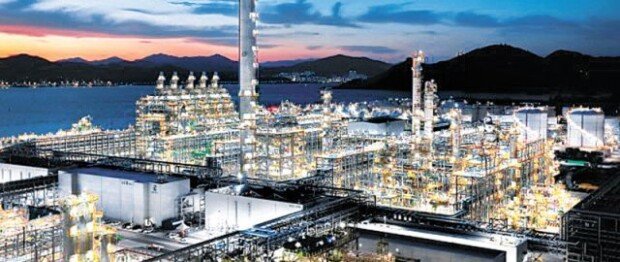GS Caltex to open new olefin plant in Yeosu
GS Caltex to open new olefin plant in Yeosu
Posted November. 14, 2022 07:55,
Updated November. 14, 2022 07:55

GS Caltex announced on Sunday that it would launch efforts to become a comprehensive energy company with the construction of its new olefin production facility, in which the company invested 2.7 trillion won, the biggest amount since its foundation. The company’s expansion into a non-oil refining business will further accelerate its business diversification.
GS Caltex held a ceremony on Friday for the opening of the new mixed feed cracker (MFC) facility located near its Yeosu plant 2 in South Jeolla Province. The ceremony was attended by key executives of GS Group and Chevron Corporation, including GS Group Chairman Heo Tae-soo and GS Caltex CEO Heo Se-hong, as well as Honorary Chairman of GS Group Heo Dong-su and Governor of South Jeolla Province Kim Yung-rok.
The MFC refers to a facility that allows the input of various materials. With the completion of the new MFC facility, GS Caltex now has annual production capacities of 750,000 tons for ethylene, 500,000 tons for polyethylene, 410,000 tons for propylene, 240,000 tons for Mixed C4, and 410,000 tons for pyrolysis gasoline. A member of GS Caltex explained that it could reduce profit and loss volatility to external factors, such as oil prices, by expanding its petrochemical business in its business structure to increase the share of non-oil refining areas.
Unlike the naphtha cracking center of a typical petrochemical company that inputs naphtha as a raw material, the MFC facility allows input of not only naphtha but also liquefied petroleum gas and petroleum refinery gas produced at an oil refinery. It can reduce energy consumption by about 10 percent compared to an oil refining facility of a similar size as it uses petroleum refinery gas produced at GS Caltex’s existing upgraded facility as a raw material.
GS Caltex also explained that about 2.8 million jobs were created during the construction of the new facility, and the number of permanent jobs available for the facility’s operation is about 200. The construction also contributed to the local economy by signing contracts worth over 700 billion won with local small and medium-sized companies for design, procurement, and construction.
Do-Young Kwak now@donga.com
Headline News
- Joint investigation headquarters asks Yoon to appear at the investigation office
- KDIC colonel: Cable ties and hoods to control NEC staff were prepared
- Results of real estate development diverged by accessibility to Gangnam
- New budget proposal reflecting Trump’s demand rejected
- Son Heung-min scores winning corner kick







